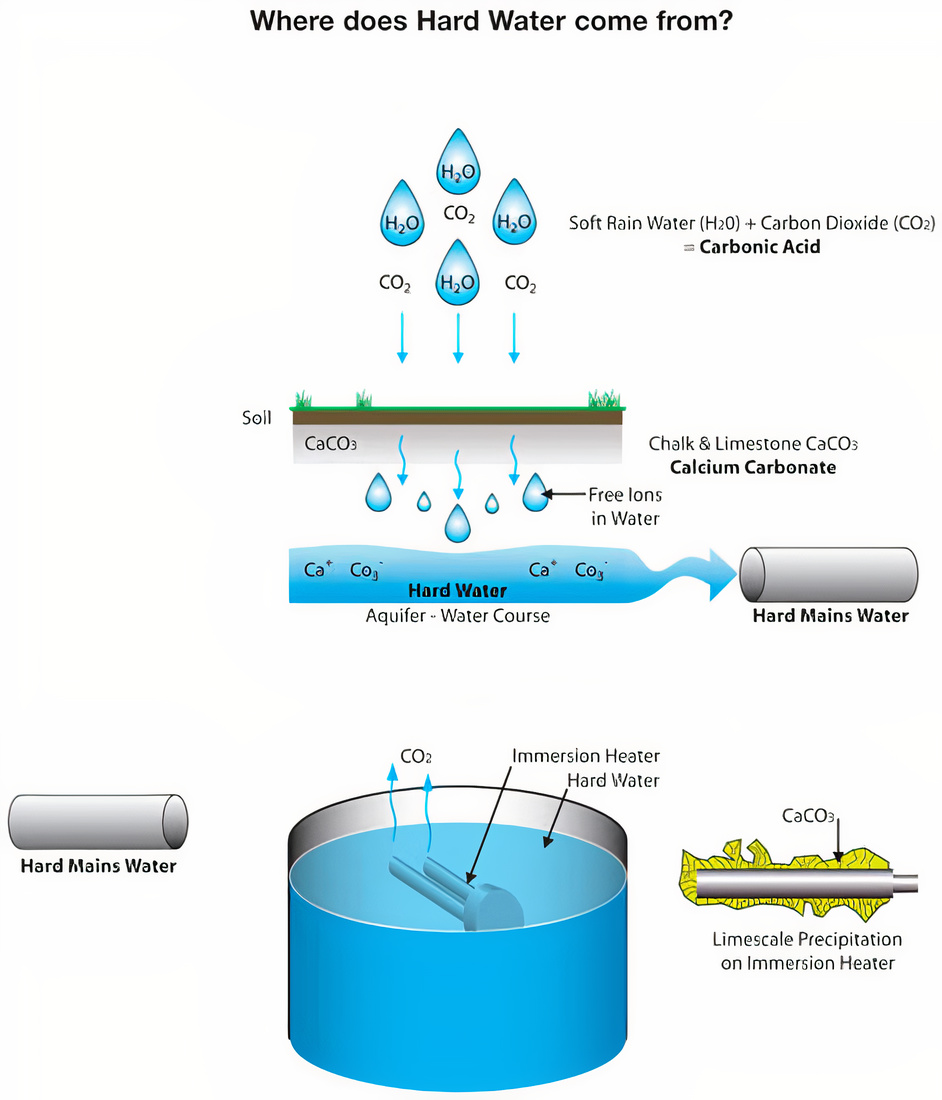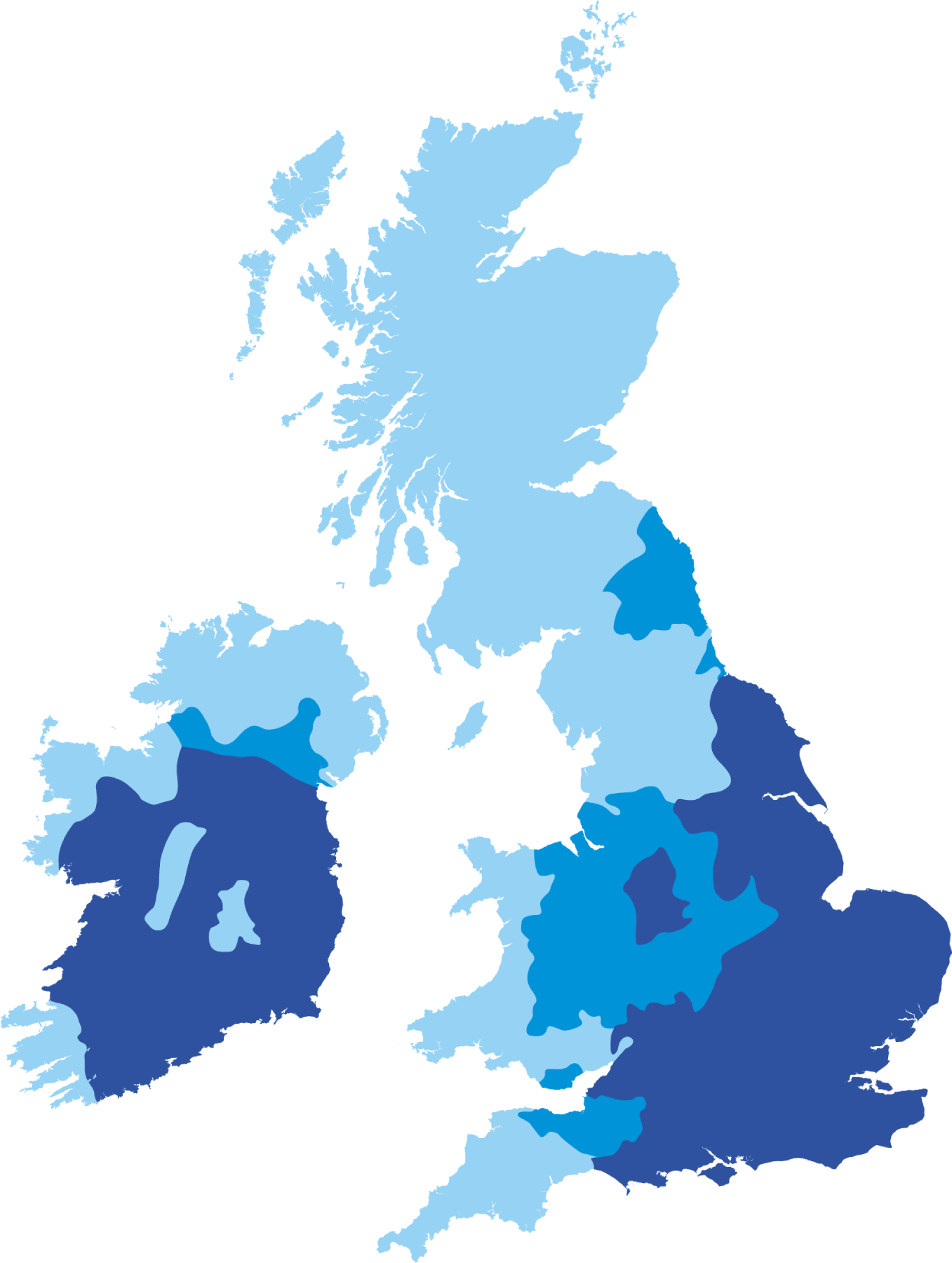What is hard water?
Hard Water is water into which the salts of Calcium Carbonate (Chalk) and Magnesium Carbonate have dissolved.

Where in the UK does hard water occur?
Hard water is only found in areas where the ground has a high chalk content.

How does hard water affect me?
Hard water I good for you. Calcium is an essential element in the healthy metabolism of all cells including human cells. Calcium is also the major element in bones and teeth so for growing children and animals it is vital.
How does water become 'hard'?
Natural rainwater dissolves chalk (in areas of the country where geological conditions are such that rainwater soaking until the ground has to pass through chalk) which then causes the water to become “hard”. When hard water is used in plumbing systems the salts come out of the solution and deposit as limescale causing a wide variety of problems.
How does hard water affect my home or premises?
The biggest problem caused by hard water is the dissolved salts of chalk precipitated out of solution under certain conditions and become LIMESCALE. This not only blocks pipes but causes no end of plumbing problems the most costly of which is the poor transference of heat when the heat exchangers in the boiler/immersion become coated with limescale. Other expensive problems caused by limescale are the shortening of the lives of domestic appliances, dishwashers, washing machines etc.
Many other problems include the exacerbation of eczema and psoriasis plus poor soap, detergent, shampoo and the furring up of kettles to name a few.
How do I precent the problems of hard water?
One option would be to move to a soft water area such as Scotland but if you live in a hard water area and you do not want to move home to a Soft Water Area then you can install a Little Plumber water softener.
Why are the LP units amongst the best on the market?
Splendid Products have been designing and making electronic water treatment units for 20 years and in that time have greatly improved the output and performance of their Little Plumber units. By using a new dual output system on all units (excluding the LP1 and SOLO) the frequencies produced become harmonic which greatly increases the performance of products by increasing the rapidity of crystallisation.
What kind of water pipes can be treated?
All kinds of pipes can be treated including plastic, galvanised steel and of course copper. Lead pipes can be treated but the effect takes longer because of the pipe density.
Tell me more about water softeners?
The traditional water softener uses a bed or column of resin and common salt (NaCl) to remove the ions of Calcium from the hard water and replace them with Sodium from the salt. The resulting effluent is poured down the drain causing pollution. Certain states in the USA have now banned salt softeners notably California and Texas. The soft water produced should not be drunk.
This process is called ion exchange because the main ion responsible for hard water, Calcium is replaced with Sodium. The softening unit requires plumbing with a dedicated cold feed to the kitchen tap (delivering untreated hard water for drinking but kettles will still scale-up)
Another more costly method is called reverse osmosis where hard water is forced through a membrane removing the Calcium ions. This method is used to produce really soft and virtually mineral-free water and is not used much in domestic situations.
Electronic water softeners/conditioners. These are basically electrical or originally magnetic systems where the ions of Calcium and Carbonate are encouraged to recombine in the water to make tiny crystals of chalk. These stay in colloidal suspension leaving the surrounding water softer.
Magnets clipped to a cold pipe only work if the water is moving and their effectiveness is not constant or controlled. They seem to work only for a short period and then stop.
Electronic versions deliver a carefully selected range of low-frequency radio waves and depending on the ranges and frequencies used deliver a variable degree of softness and limescale prevention.
